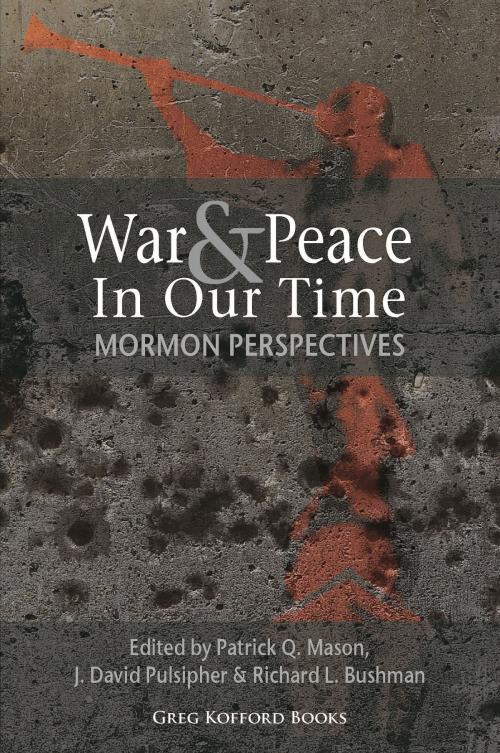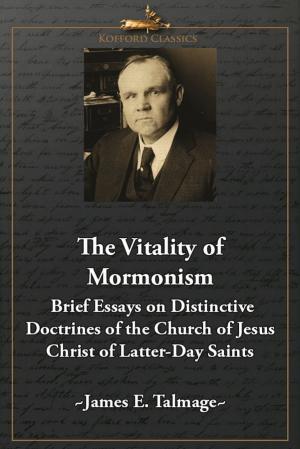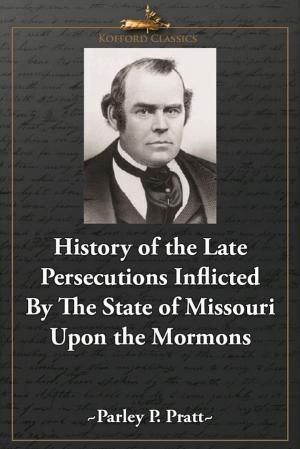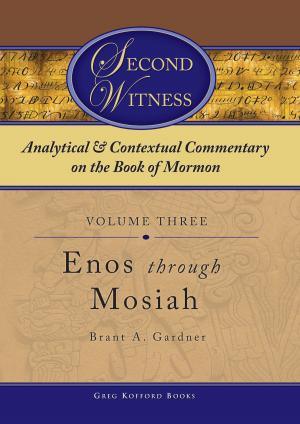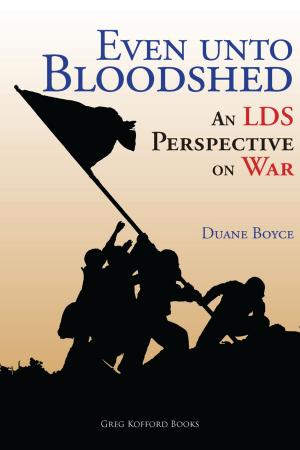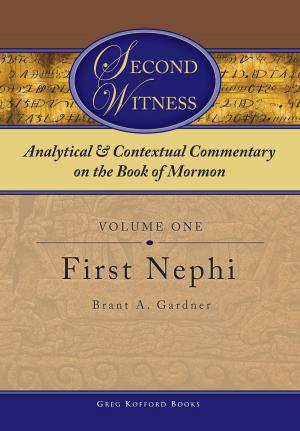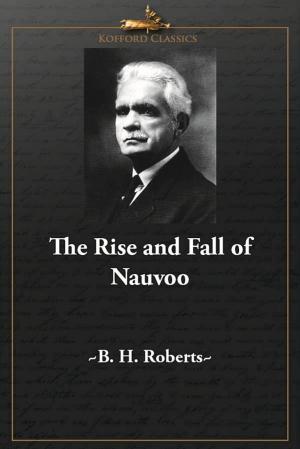War & Peace in Our Time: Mormon Perspectives
Nonfiction, Social & Cultural Studies, Current Events, Political Science, Government, Local Government, Religion & Spirituality, Christianity, Denominations, Mormonism| Author: | Patrick Q. Mason, J. David Pulsipher, Richard L. Bushman | ISBN: | 1230002684840 |
| Publisher: | Greg Kofford Books | Publication: | October 15, 2018 |
| Imprint: | Language: | English |
| Author: | Patrick Q. Mason, J. David Pulsipher, Richard L. Bushman |
| ISBN: | 1230002684840 |
| Publisher: | Greg Kofford Books |
| Publication: | October 15, 2018 |
| Imprint: | |
| Language: | English |
These essays reveal how the scriptures, prophetic teachings, history, culture, rituals, and traditions of Mormonism have been, are, and can be used as warrants for a wide range of activities and attitudes—from radical pacifism to legitimation of the United States’ use of preemptive force against its enemies. As a relatively young religion that for much of its early history was simply struggling for survival, Mormonism has not yet fully grappled with some of the pressing questions of war and peace, with all of the attendant theological, social, and political ramifications. Given the LDS Church’s relative stability and measure of prominence and influence in the early twenty-first century, the time is ripe to examine the historical, spiritual, and cultural resources within the tradition that provide a foundation for constructive dialogue about how individual Latter-day Saints and the institutional Church orient themselves in a world of violence. While recognizing the important contributions of previous scholars who had offered analysis and reflection on the topic, these essays offer a more sustained and collaborative examination of Mormon perspectives on war and peace, drawing on both historical-social scientific research as well as more normative (theological and ethical) arguments.
Praise for War & Peace in Our Time:
“This provocative and thoughtful book is sure both to infuriate and to delight. It brings together reflections and advocacy pieces by an eclectic and serious group of scholars, national security professionals, and peace activists, united by a common passion to discern within Latter-day Saint scriptures and history patterns of thought concerning the causes of war and the conditions of peace. The contributions range from expansive definitions of national defense to philosophic pacifism and from subtle arguments to crusading manifestos. The essays demonstrate that exegesis of distinctly Latter-day Saint scriptures can yield a wealth of disputation, the equal of any rabbinical quarrel or Jesuitical casuistry. This volume provides a fitting springboard for robust and lively debateswithin the Mormon scholarly and lay community on how to think about the pressing issues of war and peace.” — Robert S. Wood, Dean Emeritus, Center for Naval Warfare Studies, Chester W. Nimitz Chair Emeritus, U.S. Naval War College
“This is an extraordinary collection of essays on a topic of extraordinary importance. The editors have deliberately included thoughtful LDS voices on war and peace from a variety of perspectives—from peace activists and veterans to historians and national security professionals. The result is a book that will frustrate easy answers and partisan positions. The Book of Mormon includes both military heroes and a devastating critique of militarism; J. Reuben Clark was indeed a pacifist, but for problematic reasons; Hugh Nibley’s strong aversion to war came directly from his personal experiences on the battlefield, while other Mormons have been able to reconcile their commitment to “renounce war and proclaim peace” with their service in uniform. When is state-sanctioned violence necessary or appropriate? Does war ultimately do more harm than good? Are the alternatives reasonable or realistic? Whatever your current opinion on the topic, this book will challenge you to reflect more deeply and thoroughly on what it means to be a disciple of Christ, the Prince of Peace, in an era of massive military budgets, lethal technologies, and widespread war.” — Grant Hardy, Professor of History and Religious Studies, University of North Carolina, Asheville, Author, Understanding the Book of Mormon: A Reader’s Guide
“Mormons take their morality seriously. They are also patriotic. Tragically, the second trait can undermine the first. When calls for war are on the horizon, it is possible for well-intended Saints to be too sure of our selective application of scripture to contemporary matters of life and death, too sure that we can overcome evil by force, that we can control the results of military conflict, that war is the only option for patriots. Yet pacifism has its own critics. This collection of differing views by thoughtful scholars comprises a debate.Reading it may save us in the future from enacting more harm than good in the name of God, country, or presumption.” — Philip Barlow, Arrington Chair of Mormon History and Culture, Utah State University, Author, Mormons and the Bible: The Place of the Latter-day Saints in American Religion
“I consider this book an absolutely essential resource for any latter-day Saint seeking to understand God’s will regarding war. . . . [Y]ou really ought to buy this book!” — Alan Rock Waterman, Pure Mormonism
“This collection won’t provide any individual answers, but it marvelously succeeds in providing readers with seventeen examples of thoughtful decisions on a weighty topic.” — Gregory VanWagenen, The Mormon Worker
“I read several of the essays aloud to friends and family, and found that they did indeed encourage deep thought and animated dialogue. . . . I can’t think of any books I have read dealing with these issues from a Latter-day Saint pacifist stance, and I am encouraged to see the publication of this collection.” — Cheryl Bruno, Worlds Without End
“[T]his collection of essays will help us as members to think more responsibly, and act more wisely as we pursue what stance is best to follow.” — Colby Townsend, Association for Mormon Letters
These essays reveal how the scriptures, prophetic teachings, history, culture, rituals, and traditions of Mormonism have been, are, and can be used as warrants for a wide range of activities and attitudes—from radical pacifism to legitimation of the United States’ use of preemptive force against its enemies. As a relatively young religion that for much of its early history was simply struggling for survival, Mormonism has not yet fully grappled with some of the pressing questions of war and peace, with all of the attendant theological, social, and political ramifications. Given the LDS Church’s relative stability and measure of prominence and influence in the early twenty-first century, the time is ripe to examine the historical, spiritual, and cultural resources within the tradition that provide a foundation for constructive dialogue about how individual Latter-day Saints and the institutional Church orient themselves in a world of violence. While recognizing the important contributions of previous scholars who had offered analysis and reflection on the topic, these essays offer a more sustained and collaborative examination of Mormon perspectives on war and peace, drawing on both historical-social scientific research as well as more normative (theological and ethical) arguments.
Praise for War & Peace in Our Time:
“This provocative and thoughtful book is sure both to infuriate and to delight. It brings together reflections and advocacy pieces by an eclectic and serious group of scholars, national security professionals, and peace activists, united by a common passion to discern within Latter-day Saint scriptures and history patterns of thought concerning the causes of war and the conditions of peace. The contributions range from expansive definitions of national defense to philosophic pacifism and from subtle arguments to crusading manifestos. The essays demonstrate that exegesis of distinctly Latter-day Saint scriptures can yield a wealth of disputation, the equal of any rabbinical quarrel or Jesuitical casuistry. This volume provides a fitting springboard for robust and lively debateswithin the Mormon scholarly and lay community on how to think about the pressing issues of war and peace.” — Robert S. Wood, Dean Emeritus, Center for Naval Warfare Studies, Chester W. Nimitz Chair Emeritus, U.S. Naval War College
“This is an extraordinary collection of essays on a topic of extraordinary importance. The editors have deliberately included thoughtful LDS voices on war and peace from a variety of perspectives—from peace activists and veterans to historians and national security professionals. The result is a book that will frustrate easy answers and partisan positions. The Book of Mormon includes both military heroes and a devastating critique of militarism; J. Reuben Clark was indeed a pacifist, but for problematic reasons; Hugh Nibley’s strong aversion to war came directly from his personal experiences on the battlefield, while other Mormons have been able to reconcile their commitment to “renounce war and proclaim peace” with their service in uniform. When is state-sanctioned violence necessary or appropriate? Does war ultimately do more harm than good? Are the alternatives reasonable or realistic? Whatever your current opinion on the topic, this book will challenge you to reflect more deeply and thoroughly on what it means to be a disciple of Christ, the Prince of Peace, in an era of massive military budgets, lethal technologies, and widespread war.” — Grant Hardy, Professor of History and Religious Studies, University of North Carolina, Asheville, Author, Understanding the Book of Mormon: A Reader’s Guide
“Mormons take their morality seriously. They are also patriotic. Tragically, the second trait can undermine the first. When calls for war are on the horizon, it is possible for well-intended Saints to be too sure of our selective application of scripture to contemporary matters of life and death, too sure that we can overcome evil by force, that we can control the results of military conflict, that war is the only option for patriots. Yet pacifism has its own critics. This collection of differing views by thoughtful scholars comprises a debate.Reading it may save us in the future from enacting more harm than good in the name of God, country, or presumption.” — Philip Barlow, Arrington Chair of Mormon History and Culture, Utah State University, Author, Mormons and the Bible: The Place of the Latter-day Saints in American Religion
“I consider this book an absolutely essential resource for any latter-day Saint seeking to understand God’s will regarding war. . . . [Y]ou really ought to buy this book!” — Alan Rock Waterman, Pure Mormonism
“This collection won’t provide any individual answers, but it marvelously succeeds in providing readers with seventeen examples of thoughtful decisions on a weighty topic.” — Gregory VanWagenen, The Mormon Worker
“I read several of the essays aloud to friends and family, and found that they did indeed encourage deep thought and animated dialogue. . . . I can’t think of any books I have read dealing with these issues from a Latter-day Saint pacifist stance, and I am encouraged to see the publication of this collection.” — Cheryl Bruno, Worlds Without End
“[T]his collection of essays will help us as members to think more responsibly, and act more wisely as we pursue what stance is best to follow.” — Colby Townsend, Association for Mormon Letters
